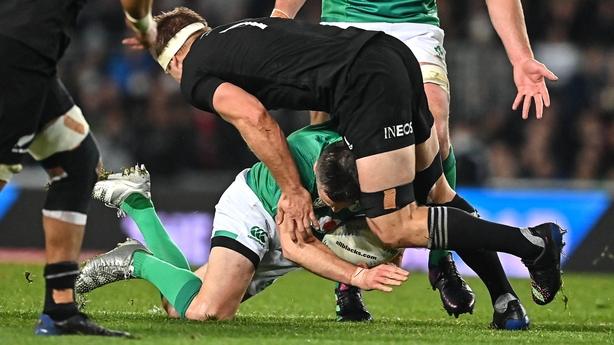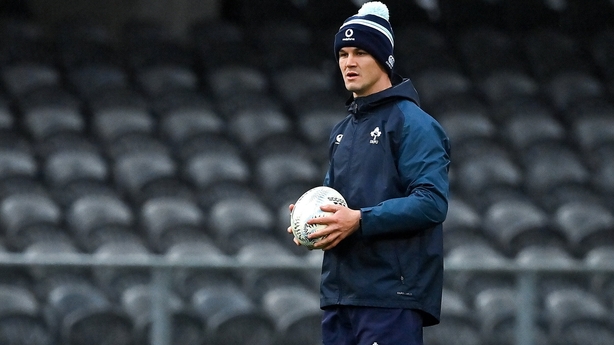Ireland captain Johnny Sexton has explained the series of events that led to confusion around the extent of his head injury, ahead of tomorrow's second Test with New Zealand in Dunedin.
Sexton, who turns 37 on Monday, will start at out-half tomorrow, having been cleared of concussion despite failing a head injury assessment during last week's first Test in Auckland.
The captain was removed from the field of play late in the fist half after an accidental collision with All Blacks skipper Sam Cane, before failing his HIA, which led to him missing the rest of the match.
Under the recently introduced protocols of World Rugby, Sexton would have been in line for a 12-day stand-down period, just as New Zealand's Sam Whitelock will now be doing after he experienced concussion symptoms in the days following the game.
However, as World Rugby have clarified in recent days, the in-game HIA is designed to identify suspected concussion, with two further HIAs in the hours and days after the game ultimately confirming or clearing a player of having a concussion.
The confusion arose this week after Sexton failed his HIA1 during the game, before passing further tests which cleared him of having a concussion.

"I've been asked the same questions before, you go off for a HIA and you don't come back on, everyone presumes that’s a concussion, but it’s not," Sexton explained.
Leading player welfare group Progressive Rugby have criticised the HIA process in the wake of the incident, but Sexton maintains he is fully fit and safe to play again this weekend.
"It’s just, if there is a suspected [concussion] or if there is any doubt about the player [they get removed]. Obviously the independent doctor felt, for whatever reason, my reaction to the knock, or whether it was one or two little things in the test. But, anyway, that’s history now. Looking forward to this week," he said.
"I just had to do all the necessary tests. Obviously, I got the knock in unfortunate circumstances, slipping into a tackle. But I was fine, honestly.
"I went off for tests expecting to come back on and wasn't allowed, which is fair enough. That’s what it’s there for. It’s there to protect players, if there is a suspected concussion that they are kept off, and that’s what happened with the independent doctor.
"As frustrating as it was for me at the time, it's just life. Moved on, did all the tests and, obviously, passed all of them with flying colours."
It speaks to the profile of the Ireland veteran that World Rugby have moved to clarify and defend the HIA process this week, following a lot of confusion as to how a concussion is diagnosed.

If a player displays obvious signs of concussion (loss of consciousness, poor balance, confusion) they are permanently removed with no HIA process, but for those who do undergo the head injury assessment, they will be asked a series of questions which they have previously answered, which act as a baseline.
However, Sexton explained that given the adrenaline of the game, the questions can often be tough to answer.
As such, he says that in recent years they have changed the baseline questions to accurately reflect the more chaotic nature during a game.
"We were doing our baseline tests when we were fresh and we were coming off the pitch having got a knock and played on, for example, and they want to check you, and you come off and you fail.
"We ended up doing our baselines in the middle of a session and got a more realistic one.
"They are tough to pass like, know what I mean? But, again, you saw the one during the Maori game [Jeremy Loughman incident], obviously a totally different thing and that has been criticised as well.
"So, it's very hard to win in this scenario. But, like I said, everyone just tries to do their best by the players.
"We have got a great medical staff and set-up here. I think they expected to see me back on but, look, we passed all the tests and we are ready to go now this week, thankfully."
Listen to the RTÉ Rugby podcast on Apple Podcasts, Soundcloud, Spotify or wherever you get your podcasts.
Follow Ireland's second Test against New Zealand via our live blogs on rte.ie/sport and on the RTÉ News App or listen to live radio commentary on RTÉ 2fm (8.05am)


